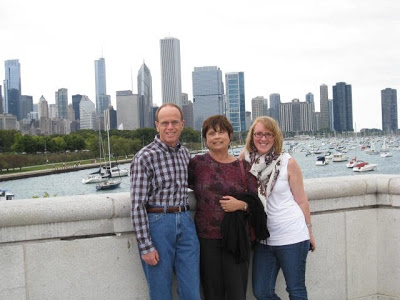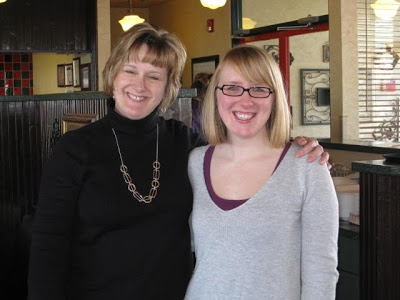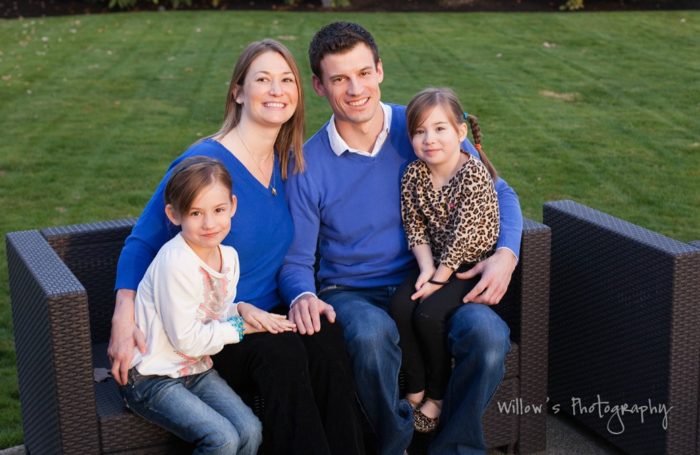 Andrea and her adoptive parents
Andrea and her adoptive parents Andrea and her birth mom.
Andrea and her birth mom.
Could you tell us a bit about your adoptive family?
I was adopted when I was three months old. I grew up in Southern Illinois about fifteen minutes east of St. Louis, in a suburban town that can lay claim to having the world’s largest ketchup bottle and being the horseradish capital of the world. My father was a finance manager at Anheuser-Busch before recently retiring; my mother was a high school teacher who retired early to raise me while substitute teaching part-time and volunteering at our church and my school.
I don’t remember ever not knowing I was adopted. My parents say that they started telling me from the earliest signs of my recognition. I even remember being five and asking to buy this cartoon-illustrated book called “Why Was I Adopted?” Basically, my parents always conveyed to me that I was extra-special by being adopted, so between that and then all the perks of being an only child, I just kind of loved it.
I was always curious to know who they were. But I always thought I had the easier end of the deal. I couldn’t imagine being someone who carried a child for nine months and went through the pain and process of delivering and then have absolutely no idea where he or she was in the world: how they were doing, if they were successful or married or had kids of their own, or if they were even alive.
So I wanted to meet at least my birth mother, even if she didn’t want to have a relationship with me, to tell her that I was more than okay. That I graduated from college, am gainfully employed, have a huge network of friends and family and, other than the requisite teenage girl dramatics, never felt alone or out of place. That I’ve had the best possible life I can imagine, and as painful as it may have been, that she had made the right decision in giving me up.
How did you adoptive parents feel about you looking for your birth parents?
They were always supportive. They knew it was something I had thought about, and they encouraged me to do it sooner rather than later in life, since you never know about people’s health as they get older. Of course, I think there was a lot of unspoken caution on their part.
They didn’t want to see me get hurt, and I’m sure there was also the unavoidable fear of being replaced or of me liking her better.But they never let those fears take over or try to prevent me from searching. They absolutely knew this was about me and not reflective on them or their parenting, which is a mistake that I think some adoptive parents make when they get hurt and aren’t supportive of the search process.
Can you tell us about the process of locating your birth mom?
I wanted to do it through formal channels rather than going back-room private-eye. I had to wait until I was 21, which was when I was a legal adult for search purposes. I called the agency I’d been adopted through and indicated I wanted to find my birth mother. They placed me on their search waiting list, which was three years because of the volume of requests.
During the summer of 2008, I got the call that I was “up,” and had to pay a few relatively minor search fees and do a lot of paperwork filing with the State of Illinois. Once that cleared, the social worker called me and said she had my birth mom’s info, but that my mom would have to give consent to be in contact with me – kind of a nerve-wracking conversation!
Ultimately, I learned that she did want to be in contact, but that I’d have to wait for her to file her own paperwork with the State and then have them release her contact information to me. (Adoption is a lesson in bureaucracy.) When I finally got her name/address, I Googled feverishly trying to find out details before…wanting more. I didn’t know where to start. I kind of froze.
But we ended up sending each other letters about a month later, and then after a few more letter exchanges we met in person over Christmas 2008. My adoptive parents came with me, and she brought her two sons (my half-brothers!), her sister, and her mother.
How did you feel when you met your birth mom? Did you share a lot of similarities?
It was surreal. There were a lot of tears from others but I didn’t cry at all, and I thought there was something wrong with me! But I think I just felt kind of overwhelmed. We were meeting, of all places, at a pizza parlor (due to locations and schedules, we couldn’t meet at one of our houses), so I think I also felt awkward having this very momentous occasion in a public restaurant. But it was a really fantastic day.
I loved hearing stories from her and catching her up on my life so far. Meeting her wasn’t like looking in a mirror or anything, although she is similarly social and gregarious, and I do think she gave me a lot of my independence. (One of the foster families, in their letter to my parents, said I was the most independent baby they’d ever had. At three months.) I haven’t gotten a strong sense of physical similarities yet – things like twirling our hair the same way – since she lives across the country and we’ve only met in person twice now. I hope we do though.
Did she address why she gave you up for adoption?
She had gotten pregnant in college, via a relationship that had ended by the time she found out. She wasn’t ready to raise a baby, and due to family circumstances at the time, her parents weren’t in a position to raise me either. They were all strong Catholics and other options weren’t on the table, so adoption it was!
However, I understand my birth father was not very involved in the process, and he couldn’t even be found to sign the paperwork to release his rights to me. So I’m not as inclined to undertake the birth father search right now, although maybe someday I’ll be interested.
Did you feel that meeting her brought any closure to your life? Did it affect your relationship with your birth parents at all?
It’s been more of an opening than a closure, I think. I feel like it’s been an incredible life bonus. I have a new relationship that is slowly growing with my birth mother, and this past Christmas I also met another of her brothers and his family. And I still have like twenty more family members to meet! She has a huge family!
As for how it’s affected my relationship with my adoptive parents, I think it’s brought us closer. It’s made me realize that parents aren’t necessarily who genetically made you. It’s who brought you chicken soup when you were sick and held your head when you were sobbing over a boy and who cheered at your high school and college graduations. I love knowing my birth mother, but my adoptive parents are my parents, and this process has only made that more clear.
What advice would you give to others who are looking to meet their birth parents?
I tried to prepare myself for a lot of scenarios before I made contact – that my birth mom hadn’t told her current family about me, that she was of vastly different economic/education/social circumstances, that she was not a pleasant person, that she wouldn’t want me in her life even if/when I found her. Doing that made me feel ready for anything, so I wouldn’t go off the rails if things didn’t work out.
To every extent possible, make sure that you are emotionally stable with your current family and friends so that if things don’t work out like you’d hoped, you have a support system ready. And I also think it’s important not to look at finding birth parents as a panacea to whatever discomfort or angst you’ve felt, either about being adopted or in general. The process can certainly provide answers, and in the best scenarios you gain a whole extra family that’s been waiting to find you, but I think a lot of the people have their hearts broken because of unrealistic expectations.
I understand that I have been abnormally, absurdly lucky. But, obviously excluding cases of physical or emotional abuse by adoptive or birth parents, I think being adopted is such a profound gift. It’s often given me a sense of peace that I’m exactly where I’m supposed to be.
Are any of you adopted? Have you met your birth parents? Any questions for Andrea?
P.S. Other True Stories about family, I lost my sister to domestic violence & My mom died three months before my wedding day.












Thank you so much for sharing, Andrea. I love that you wanted to make sure your birth mother knew you were ok – more than ok, as you put it. Such an incredibly generous perspective – one that I imagine was (at least in part!) shaped by your awesome parents 🙂
This was such a heart-warming life story!
As another reunited adoptee, I am happy for you that you found your birthmother. However, here is another interpretation of your story:
"had to wait until I was 21, which was when I was a legal adult for search purposes."
In other words, despite the fact that you are old enough to buy a house or serve as a soldier at 18, the State stole three years of your relationship with your birthmother from you. I had 16 years with my birthmother before she died last year of emphysema, and I resent every one of the twelve years it took me to find her.
"They placed me on their search waiting list, which was three years because of the volume of requests"
And then the State stole three MORE years of your relationship with your birthmother from you. My search included a judge's order that my adoption agency contact my birthmother for me, and they assured me they were trying. Yet I learned when I contacted her on my own that they had never even opened a telephone book to find her. I suspect your case was being addressed with similar dispatch.
"she did want to be in contact, but that I’d have to wait"
In other words, despite the fact that two consenting, RELATED adults wished to communicate, the State stole several MORE months of your relationship with your birthmother from you. So your constitutional right of free assembly was denied you by the State. And for what, exactly?
So, who will recompense you for the six years and several months that you were unjustly denied your relationship with your birthmother? I personally would have preferred a 22-year relationship with my birthmother rather than just 16 years.
There is a lot of pressure upon adoptees to conform: first to conform to the expectations that we will suppress our natural curiosity and desire to find our birth families, then to conform to the mythology around adoption. That mythology tells us that we ought to be grateful for being adopted, implying that we are somehow less worthy than other children of parental love and that we are privileged to receive what other infants receive naturally. The mythology of adoption casts us as perpetual children – even after age 21, even after two adults have confirmed they wish to meet.
The fact is, after you're an adult NOBODY has the right to restrict your access to your birhtmother.
The fact is, you are NOT obligated to be grateful for having been adopted. You may choose to be, but it may not be expected of you.
Stories like this may be "heart warming," but they are the thin silver lining on the dark cloud of adoption: a story of adults routinely denied their Constitutional rights, of lives lived in ignorance, of the disappointment of adoptees whose reunions come too late, of adoptees whose health is risked by lack of appropriate medical background, for no purpose at all.
The adoption industry ought to be the most open and transparent of all. Instead agencies operate without oversight, in secrecy, obtaining infants who-knows-how, restricting adults' access to their own information.
And we all call it "heartwarming," because it conforms to a comfortable mythology at the cost of real lives.
My fiance & I have both really wanted to adopt for a long time. We're still young, so it won't be for awhile, but I have worried about this! While I'm sure not all experiences are like this (the comment above is a little frightening, I suppose) it's good to know that you had such a positive experience.